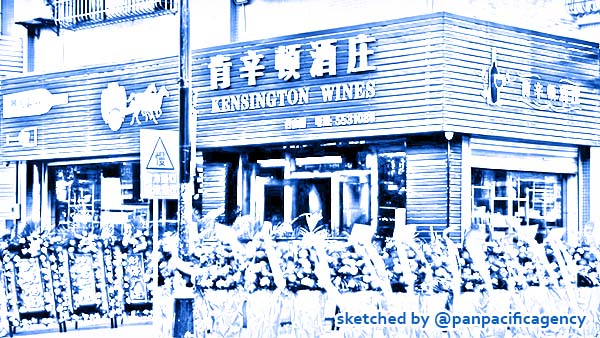China’s wine dumping allegations leave the industry gobsmacked, both in Australia and China

Kensington Wine is grown in the Goulburn Valley and mainly exported to China, where its considered a premium product.(Supplied: Kandy Xu). Sketched by the Pan Pacific Agency.
CANBERRA, Aug 27, 2020, ABC News. Australian winemakers are adamant that their product has not been sold on the cheap in China but say they are willing to cooperate fully with the 18-month anti-dumping probe. The investigation by the Chinese Government will examine claims from China’s own winemakers that Australian exporters have been selling wine in that market for less than it cost to produce, and that Australian winemakers are subsidised, ABC News reported.
Sales of Chinese produced wine accounted for 75 per cent of market share in 2015, but that had dropped to just 50 per cent last year.
At the same time exports of Australian wine to China grew from $268 million in 2015/16 to $1.75 billion by 2018/19.
Kandy Xu and her husband Huigao Xu fell in love with Australian wine more than a decade ago, and are making their own under the Kensington Wine label with grapes they grow in northern Victoria’s Goulburn Valley.
The majority of their wine is exported to China, where Australian wine is the most popular overseas drop.
“I have not received any subsidy from the Australian Government,” Ms Xu told the ABC.
“I’m afraid I have to disagree with the allegation that Australian wines have been dumped in China.
“The reason for saying this is because the data shows that the average price of wine exported from Australia to China has gradually increased in the past 10 years.”
China is the largest export market for Australia’s wines, with market share growing nearly exponentially as more Chinese drinkers fall in love with Australia’s big, bold style of red wines.
Thomas Tang left the medical profession and started importing Australian wines into China in 2002.
“In the past, the Chinese market was dominated by middle and low-end wines, but now the price and quality of Australian wines sold in China are improving,” he said.
“I have not seen any Australian wine being dumped into China.”
His small wine bar in Guangzhou fell victim to China’s coronavirus restrictions, but he is currently working on a major development, Music Park, on the outskirts of the busy tier-one city.
“The precinct includes live music entertainment, nightclubs, bars and live online streaming sales,” Dr Tang said.
“Our bar and live online streaming sales are mainly related to Australian wines.”
Investment freeze
Industry analyst Marc Soccio said, regardless of the inquiry’s outcome, its mere existence will put the brakes on investment at an already highly uncertain economic time.
“Australian wineries who have invested a lot of time and effort into the Chinese market will start to think twice about where that investment goes now, there are other markets that potentially need to be prioritised,” he warned.
The problem is no other market comes close to China’s size or value.
“The price we average in China can be twice as high as other markets,” Mr Soccio observed.
“So it’s all well and good shifting sales into other markets, but can you do it profitably? That’s really going to be the trick for producers.”
Clare Valley winemaker and industry stalwart Jeff Grossest said, after a summer of bushfires and drought, profitability is at the front of every winemaker’s mind.
“So the impact on the industry has really been at least a double whammy in this region and we’re just hanging in there really,” he said.
“We made some truly extraordinary wine this year, but we don’t have much of it.”
You can watch Clint Jasper’s story on The Business on ABC News Channel at 8:45pm (AEST).